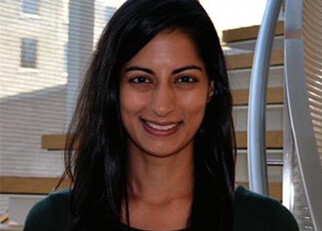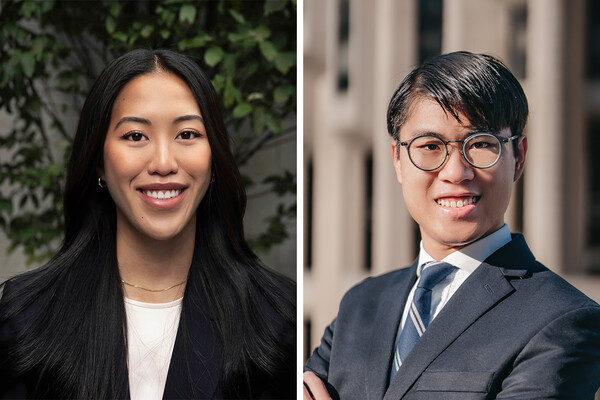Breadcrumbs
- Home
- MD/PhD Program
- News
- Talk to Us: Addressing Learner Mistreatment
Talk to Us: Addressing Learner Mistreatment

Over the past year, the MD Program introduced new policies and procedures to help learners who experience or witness mistreatment or unprofessionalism in the learning environment. Though there are multiple options, they all begin with the same first step: Talk to Us.
Professor Reena Pattani, the MD Program’s Director of Learner Experience, Professor Tony Pignatiello, Associate Dean, Health Professions Student Affairs and the academy directors are all designated program leaders working to help students feel safe to reach out and access support through negative experiences.
Recently, Pattani spoke with writer Erin Howe about the new processes to address learner mistreatment.
It's been nearly a year since new learner mistreatment policies and procedures were introduced. Have you begun to see their impact?
Previously, learners faced numerous barriers to coming forward, not just fears of retaliation, but also a lack of institutional clarity about what constitutes mistreatment and the pathways for coming forward. Our first and most important goal was to lift those barriers and make it as easy as possible for learners to access resources and support.
So far, the number of disclosures and reports that we’ve received exceeds historical averages. We suspect this is not because there are more occurrences of mistreatment, but rather because we’re building up systems for learners to reach out and share their stories. We're grateful to all the learners who have trusted us with their disclosures, because we know coming forward isn’t easy.
Almost uniformly, learners tell us they don’t want what happened to them to happen to someone else. That’s inspiring to us because part of their motivation in coming forward is a desire to see a culture change in our shared community.
What’s the most important thing for learners to know about the mistreatment policy and procedures?
Talk to us — there’s no need to struggle through a negative experience alone. Medical training is already so rigorous and we want to create a culture that allows people not just to survive, but to thrive.
We hope the threshold to reach out will be low and you’ll connect with us even if you’re not certain if what you witnessed or experienced was mistreatment. We'll work with you to unpack what happened and review potential options to help you decide how best to proceed in a way you're comfortable with and makes sense for your personal goals and values.
What options are available to students who may have experienced mistreatment?
Learners can discuss, disclose or report anything they’re concerned about. These are separate actions and learners don't need to know their exact intention when they first come forward. We set our framework up in this way to make the process for coming forward less daunting and to ensure we lift barriers for learners coming forward.
Discussion allows the learner to unpack or debrief something negative. They don't need to know in advance if it constitutes mistreatment. If a learner feels unsettled by something, we're here to discuss it and understand the impact on them.
Learners can also come forward to disclose, which is where learners wish to discuss something with the aim of understanding their options.
Finally, learners can report. This means the learner has disclosed something and selects the option to raise their concern to leadership’s attention for formal institutional review.
Historically, learners who experienced or witnessed negative things in the learning environment often suffered silently, and that shouldn't be the case. We also know the impact social identity may have on experiences of mistreatment, given that our own data and the literature show learners from equity-deserving groups carry a disproportionate burden of negative experiences. We’ve been working closely with Anita Balakrishna, Director of Equity, Diversity, and Inclusion (EDI), to ensure the systems we’re building are informed by anti-racism, anti-oppression, and EDI principles.
We also have a Learner-to-Learner Mistreatment Working Group led by Dr. Hala Muaddi and Nader Chaya advising on how best to support this nuanced form of mistreatment.
What might a learner expect during their first meeting with the Learner Experience Office?
We’ll talk about the logistics of what we can provide. Among them is talking through the differences between discussing, disclosing, and reporting. The key point is that the learner doesn't have to decide what to do at the first meeting, sometimes it takes a few meetings and that's okay. There won't be any pressure from us. We just want to make sure learners know we're there for them and that learners are aware of the supports and resources that exist to address their concerns if they wish to report.
Even if they choose not to make a report, discussions and disclosures still have a positive impact: they provide us insight into what's happening across the learning environments and may prompt consideration of systems-level interventions that might be helpful. We also hope the simple act of discussing relieves the learner of some burden.
If a learner saw something happen to a colleague, could they still share that with you?
Learners can come forward with any negative experience they've personally experienced or witnessed. The barriers to coming forward are often similar whether a learner experienced or witnessed mistreatment, and all involved face negative impacts.
Everything begins with a safe and confidential discussion to better understand what happened and possible next steps.
What kinds of barriers have kept learners from coming forward in the past?
A lack of clarity about what constitutes mistreatment and what learners can do about it has been a key barrier. This is why we redesigned our webpage interfaces, including updating our Student Assistance button. This was informed by extensive consultation with learners to ensure our new Student Mistreatment webpages are accessible and user-friendly.
Many learners have also given feedback on our education and communications activities. Several learners including Jordi Klein, Dr. Amr Hamour, Darby Little, Neha Malhotra, Mary Oluwasemipe Oni and Gagandeep Singh played key roles in designing a workshop on learner mistreatment for the 2T3 class.
Other barriers are concerns about retaliation and privacy. There are a few ways we can try to address these concerns. If it’s possible to de-identify a report, and that's the learner’s preference, we can work with them to do that. We may also delay the escalation of a report for formal review, by waiting until the learner completes a rotation, for example, if that’s their preference. And finally, if we escalate a report to the attention of a leader, we always make it clear that the leader should inform the individual responsible for the negative behavior that any retaliation or retribution would be unprofessional and would be considered its own form of mistreatment. If retaliation were found to have occurred, this would be subject to its own reviews and disciplinary actions.
How are you also working to ensure increased transparency and accountability around these issues?
We always close the loop with individual learners who come forward to let them know their concerns were reviewed with utmost seriousness by leaders within the institution. We’re also committed to publishing anannual professionalism report, which includes de-identified, aggregated information about the disclosures and reports we’ve received. Our goal is to keep our Temerty Faculty of Medicine community aware of the types of issues arising and the outcomes of these incidents in a way that protects everyone’s privacy.
We also want to keep improving on our processes and are developing ways for learners to evaluate our programs and give us feedback on how we can do better.
Finally, our office is available to faculty and other leaders who may receive a disclosure from a learner. Our hope is that they’ll reach out to us to learn more about how to refer learners or review learners’ concerns in ways that align with our processes and strive for learner safety and support.
How exciting is it to see this culture change underway?
It’s both exciting and inspiring, for two reasons.
First, it’s been great to see such an authentic institutional commitment to leading and enabling this culture change, including the vision that has been articulated by Professors Patricia Houston, Tony Pignatiello and Glen Bandiera.
Second, it's exciting because our learners are paving the way forward and shaping this agenda. I’ve learned so much from working directly with the many learners who have played a leadership role in building up these processes and implementing strategies for education and communication. Some of the learners playing a leadership role on this issue include Nader Chaya, Lina Elfaki, Safa Majeed, Lyon Qiao and Kabisha Velauthapillai from the MD Program, and Drs. Leora Branfield-Day, Samik Doshi, Amr Hamour, Justin Lam, Hala Muaddi, Parth Sharma and Aisha Yusuf Ibrahim from Postgraduate Medical Education.
All of this has shown me that even in well-established institutions, there can be room to co-create systems. Everyone within our faculty has a role to play.
Although we’ve spoken a lot about learner mistreatment, our near-term plans also include developing strategies, in partnership with Professor Pier Bryden, Senior Advisor for Clinical Affairs and Professional Values, to promote the positives and shine a spotlight on the exemplary citizenship behaviours that unfold around us every day. Our hope is that this will help showcase the positive cultural norms that need to be the standard for our learning and working environments.
More information about learner mistreatment can be found here. Resources for learners in Postgraduate Medical Education can be found here.
News


